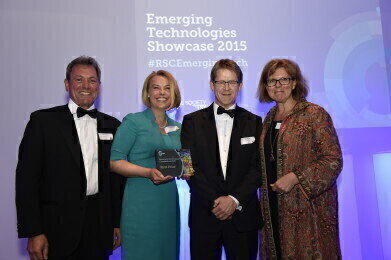-
 Haemostatix wins healthcare stream: From left to right - RSC Industry Manager, Steve Pleasance, Haemostatix’s Research Manager Dr Renata Zbozien, inventor of the Peptide Dendrimer; Haemostatix’s CEO, Dr Ben Nichols; Sherry Coutu CBE, serial entrepreneur. Credit: Royal Society of Chemistry / MPP Image Creation
Haemostatix wins healthcare stream: From left to right - RSC Industry Manager, Steve Pleasance, Haemostatix’s Research Manager Dr Renata Zbozien, inventor of the Peptide Dendrimer; Haemostatix’s CEO, Dr Ben Nichols; Sherry Coutu CBE, serial entrepreneur. Credit: Royal Society of Chemistry / MPP Image Creation
News & Views
Showcase Highlights Brightest Ideas to Industry Panels
Aug 17 2015
Thirty finalists from across Europe went head-to-head in July to pitch their ideas for the latest healthcare, energy and sustainability, and materials technologies to panels of industry experts.
The Royal Society of Chemistry’s annual Emerging Technology Showcase, now in its third year, included small companies and academic entrepreneurs from nine countries outside the UK for the first time, including Denmark, Germany, Switzerland and the Netherlands. Diverse pitches included diagnostic flu tests using gold and sugars, electricity generation from wastewater and wearable energy harvesting fabrics, among many others.
Nottingham-based Haemostatix Ltd, a University of Leicester spin-out, took first prize in the healthcare stream for their peptide dendrimer which treats bleeding during surgery and trauma. This new generation compound is based on a purely synthetic peptide construct that binds to the blood protein fibrinogen, forming a fibrin-like clot. It is being developed for less accessible bleeds and penetrating trauma wounds and has many advantages over the current standard of care, thrombin, a large, relatively fragile protein. The company’s lead compound PeproStat™ is currently in clinical trials in liver surgery at four UK hospitals.
Ben Nicholls, CEO of Haemostatix Ltd said: “This competition is highly competitive and prestigious so we are delighted to have been awarded first prize. To have the healthcare industry recognise the potential of this new technology is extremely positive and we hope that our compounds will go on to benefit patients in hospitals all over the world.”
In second and third place, were the University of Cambridge, for their cancer therapy using artificial metalloproteins, and CytoFind Diagnostics, for their picoliter droplets for detection of circulating tumour cells.
In the Energy and Sustainable category, it was Ghent University, Belgium, which won with its idea of a chemical pump for recovery of industrial waste heat. Second and third were also respectively taken by international winners in Danish InfinityPV, for their ultra-thin foil-based photovoltaic device, and the National Institute of Chemistry in Slovenia for novel catalysis for syngas production.
The University of Cambridge scooped the final first prize in Materials for its idea of metal-organic frameworks manufacturing technology for gas storage. Engineering functional materials for data communications was the idea behind the University of Leeds’ second place pitch. Bridgend’s Seren Photonics Ltd came third with GaN templates enabling next generation LED.
Each of the first prize winners won £20,000 and also tailored business support from the Society’s corporate partners. Second prize received £3,000 and third prize £2,000.
Digital Edition
Lab Asia 31.2 April 2024
April 2024
In This Edition Chromatography Articles - Approaches to troubleshooting an SPE method for the analysis of oligonucleotides (pt i) - High-precision liquid flow processes demand full fluidic c...
View all digital editions
Events
Apr 28 2024 Montreal, Quebec, Canada
May 05 2024 Seville, Spain
InformEx Zone at CPhl North America
May 07 2024 Pennsylvania, PA, USA
May 14 2024 Oklahoma City, OK, USA
May 15 2024 Birmingham, UK

















